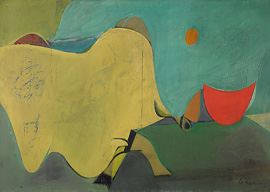
January 20, 2012

Untitled (The Cow Jumps Over the Moon), 1937–38 by Willem de Kooning
Yergin writes:
There is one key energy source that most people do not think of as an energy source. Sometimes it is called conservation; sometimes efficiency. It is hard to conceptualize and hard to mobilize yet it can make the biggest contribution of all to the energy balance in the years immediately ahead.
But savings are not a source, just like a revenue shortfall is not a loss. A loss is something that existed then disappeared, like fossil fuels or forests when they are burned; a revenue shortfall is something that could have happened but didn’t. Fond as he is of the conditional, Yergin should know the difference.
It might not have happened had Saddam not gone to war.…The result is something that would have been unimaginable without the circumstances created by the price crash.
Yergin uses the conditional to talk of economic history but never questions the conditions. The idea that energy is something that must be bought and will come to you through a grid is a given. De Kooning takes conditions and bends them to his will. Under his brush’s mechanical movements the grid becomes a web, shapes are made boundless, surges are stilled, and energy can be stored forever in a simple canvas.
The financial markets and the rising tide of investor money were having increasing impact on the oil price. This is often described as speculation. But speculation is only part of the picture, for oil was no longer only a physical commodity; it was also becoming a financial instrument, a financial asset. Some called this process the “financialization” of oil. Whatever the name, it was a process that had been building up over time.
Speculation or financialization, loss or shortfall, abstract or non-representational, potato or potahto! But the terms are important; it matters whether you call things by their name or use a euphemism.
When they say “energy security” what they really mean is unimpeded access to cheap energy sources, presented as part of a seemingly immutable world order.
But “being anti-traditional,” de Kooning reminds us, “is just as corny as being traditional.”
In the US, ethanol—a non-traditional and renewable energy source—is made mostly from corn. It is not proven however that it pollutes less, and if we consider its entire production process, it may in fact increase both food prices and pollution.
Besides, it’s still the same old reaction, combustion, the first one we happened to get a handle on, but there are others, chemical or mechanical. In combustion, something will be consumed and something released. But for what? Rather than the source, let us look at the term.